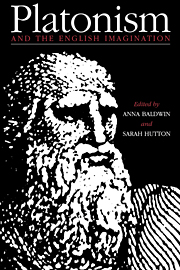Book contents
- Frontmatter
- Contents
- Notes on contributors
- Preface
- I ANTIQUITY
- II THE EARLY CHRISTIAN PERIOD AND THE MIDDLE AGES
- III THE RENAISSANCE AND THE SEVENTEENTH CENTURY
- 7 Introduction
- 8 The transformation of Platonic love in the Italian Renaissance
- 9 Uses of Plato by Erasmus and More
- 10 Italian Neoplatonism and the poetry of Sidney,Shakespeare, Chapman and Donne
- 11 Shakespeare on beauty, truth and transcendence
- 12 Platonism in Spenser's Mutability Cantos
- 13 Reason, Recollection and the Cambridge Platonists
- 14 Platonic ascents and descents in Milton
- 15 Platonism in some Metaphysical poets
- IV THE EIGHTEENTH CENTURY
- V THE NINETEENTH CENTURY
- VI THE TWENTIETH CENTURY
- Bibliography
- Index
14 - Platonic ascents and descents in Milton
Published online by Cambridge University Press: 15 December 2009
- Frontmatter
- Contents
- Notes on contributors
- Preface
- I ANTIQUITY
- II THE EARLY CHRISTIAN PERIOD AND THE MIDDLE AGES
- III THE RENAISSANCE AND THE SEVENTEENTH CENTURY
- 7 Introduction
- 8 The transformation of Platonic love in the Italian Renaissance
- 9 Uses of Plato by Erasmus and More
- 10 Italian Neoplatonism and the poetry of Sidney,Shakespeare, Chapman and Donne
- 11 Shakespeare on beauty, truth and transcendence
- 12 Platonism in Spenser's Mutability Cantos
- 13 Reason, Recollection and the Cambridge Platonists
- 14 Platonic ascents and descents in Milton
- 15 Platonism in some Metaphysical poets
- IV THE EIGHTEENTH CENTURY
- V THE NINETEENTH CENTURY
- VI THE TWENTIETH CENTURY
- Bibliography
- Index
Summary
It is usual for critics to find evidence of Platonic influence on Milton mainly in his early poetry, notably in Comus (1634), where I too will start. Here Milton seems to use a ‘dualist’ view of nature, in which spirit, which is good, is contaminated by matter, which is bad. Although I will argue that he discards this view in Paradise Lost (written about 1658-63), I will show that he replaces it not by an orthodox Christian view of nature, but by another kind of Platonism, the ‘emanationist’ view associated with Plotinus, and that this vivifies his understanding of nature and of man. Though both uses of Platonism can be set in the context of the actual seventeenth-century debates about the relationship between the mind and the body, we should see Milton's use of them as largely metaphoric, ways of approaching the mysteries of nature and man, rather than offering philosophical explanations. For as Madsen reminds us: ‘The only relevant question is what function do these ideas have in the poem itself’.
COMUS
Plato's dualism is easy enough to find. The Phaedo, the Republic, and the Timaeus (all of which Milton knew), describe the soul as being imprisoned in a body driven by its own imperfect passions, and which must be rejected if the reason and intellect inherent in the soul are to survive.The body cannot help its imperfection, because it is made of matter which is ultimately subject to an ‘Errant Cause’ outside Go's control. Following the lead given by critics such as Jayne, we can use these philosophical tenets to explain the symbolism of Comus.
- Type
- Chapter
- Information
- Platonism and the English Imagination , pp. 151 - 162Publisher: Cambridge University PressPrint publication year: 1994
- 2
- Cited by



